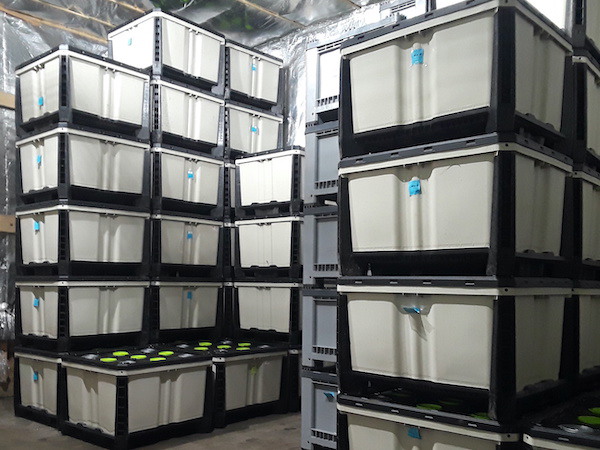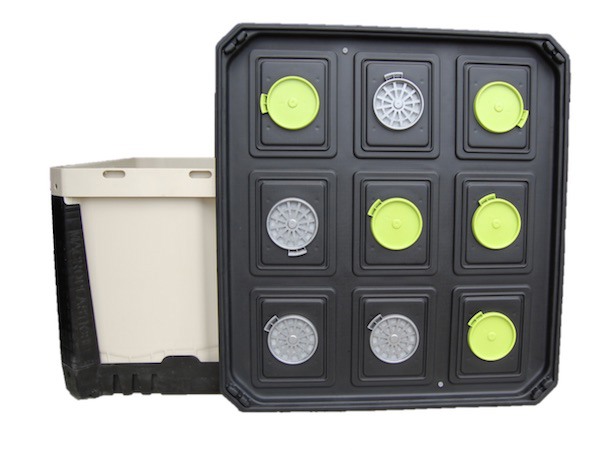Controlled atmosphere technology is vital to the agriculture industry and allows growers to store their produce for longer. But for smaller and medium-sized growers, controlled atmosphere rooms are often more difficult to access, forcing them to have to be more creative to find ways to store their products. JMT US’s bins were designed to provide a sustainable solution for this issue.

A seal, a membrane, and a cold room
Damien Challet runs the company’s North America division out of Michigan. He explains: “Ten years ago, the founders of the company, Pierre & Benoit Janny, noted that small and mid-size growers had difficulties accessing flexible storage solutions that would allow them to be more profitable while maintaining the product’s quality. That was the drive behind developing this technology: take the big controlled atmosphere rooms and make them available in a smaller size, and for a wide range of produce. That’s what our bins do.”
The bins use a special technology, combining two main parts: a seal and a membrane. All the grower needs to provide is a cold room to place the bins in. Challet explains: “Once the lid goes on, the bin is under an airtight seal, and the oxygen levels will naturally go down inside the box by using the respiration of the produce. Then, once a certain threshold is reached, gas selective permeability membranes situated on the lid will slowly let oxygen to enter the bin in a controlled manner, allowing the inside of the bin to reach the 3% oxygen level that makes it a controlled atmosphere. Because it’s an airtight seal, the water in the products doesn’t evaporate and the products are able to maintain their freshness, weight, aspects and flavor.”
 Increased storage flexibility
Increased storage flexibility
This storage solution is designed to increase flexibility to provide the market for the smaller and mid-sized growers, says Challet. “Often, apple or pear growers will rent storage space in a large controlled atmosphere room to extend their season. An issue some growers can encounter is that once the room is opened, everything is taken out and must be sold in the next weeks. With these bins, the grower can decide to open one at a time in their own cold room and leave the others sealed until they need the product inside.”
Right: Damien Challet.
He continues: “The growers will have a lot more flexibility in how and when they distribute their product, and this also helps to prevent food waste. Sometimes the demand changes suddenly, which is what we saw happen when the pandemic hit. For some products and some growers demand disappeared overnight. Then you have two options: store the product or let it spoil. With the bins, you can easily store the product, maintain its quality and then sell it when the market recovers.”
Large portfolio of products can be stored: 18 vegetables, 11 fruits, flowers, mushrooms and hemp
The bins can be used with many different products and can be reused throughout the season. Challet explains: “The bins have membranes that let oxygen go through slowly. Depending on the product you store in it, you adjust the flow of oxygen by covering those membranes. Each product has provided guidelines from JMT US. For example, asparagus consumes more oxygen than lettuce so it will require to have more open membranes. So there is a lot of flexibility for the growers – they can start using them in the beginning of the year for one product and then once those products have been sold, they can use the bins later on in the year for the next product that comes into season. They can use them multiple times a year, for up to twenty years.”

This wide range of use is what makes these bins a relevant equipment for larger growers too. “Apart from apples, pears and kiwifruits, for which our bins mainly match the needs of small to mid-sized growers, for the rest of our range, large growers do not have comparable solutions. In Europe we have many large growers among our clients, who are using several hundreds of bins to smooth their production peaks and reduce their losses, for cabbages, broccoli, or peonies for example,” Challet shares.
The company is currently working on expanding the variety of products that can be stored in the bins. “We are experimenting a lot with products such as garlic or fresh herbs. In our trials, we were successful in storing garlic for 10 months and parsley 6 weeks. We are also expanding into the cannabis field, which has proven very successful: the cannabis stores very well in our bins and it’s an exciting development for us,” Challet concludes.
For more information:
Damien Challet
JMT US LLC
Tel: +1 (517) 219-5418
Email: [email protected]
www.jmt-us.com
